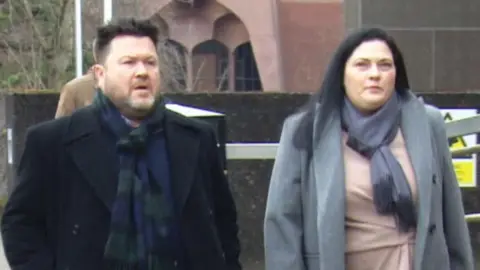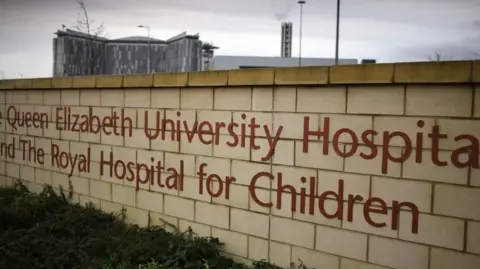Nurse stands by care of baby after infection death
 BBC
BBCA senior charge nurse who cared for a baby who died from an infection she got at a hospital has told an inquiry she would not have done anything different.
Lorna McSeveney was giving evidence at the fatal accident inquiry (FAI) of Sophia Smith, who was just 11 days old when she died at Glasgow's Royal Hospital for Children on 11 April 2017.
Sophia, who had Down's syndrome, had been transferred from the Royal Alexandra Hospital in Paisley, Renfrewshire, due to breathing difficulties.
It was then discovered that there was a problem with her heart.
Despite an initial improvement in her health, Sophia later suffered bleeding and a collapsed lung.
After Sophia's death, tests found that she had a serious bacterial infection.
An FAI is a public examination of the circumstances of a death in the public interest before a sheriff. It does not apportion blame or fault.
Sophia's parents Mathew and Theresa Smith have said they hope the inquiry will give them an answer as to why their daughter died and if it was preventable.
On the second day of the inquiry, Ms McSeveney - who has since retired - said that she cared for Sophia on the day before and the day of her death.
Advocate depute Chris Fyffe asked the witness if, with the benefit of hindsight, she would have done anything differently.
Ms McSeveney replied: "No, I don't think so."
The retired nurse stated that if she was aware Sophia had an infection, then she would have alerted a doctor to prescribe antibiotics.
Mr Fyffe later asked Ms McSeveney if there was anything additional which could have been done for Sophia.
She replied: "Not from my point of view."
The former nurse was earlier asked by Mr Fyffe if there was anything which gave her concern on the day before Sophia's death.
Ms McSeveney said: "Not that I remember - she was stable. She was a sick baby but she was stable."
The hearing was taken through a variety of medical graphs noted throughout the day of 10 April 2017 - the day before Sophia's death.
One graph showed that there was an increase in the amount of oxygen provided to Sophia by a machine.
Sophia was also given extra nitric oxide to help blood pressure in her lungs around 15:00 when her condition began to deteriorate.
Mr Fyffe asked Ms McSeveney if there was a discussion later that day about a possible infection, to which she replied: "I don't know."
 Getty Images
Getty ImagesThe probe earlier heard from Sophia's mum Theresa Smith who stated that she reported a change in her daughter's colour to a member of staff.
Mr Fyffe asked Ms McSeveney if she noticed a change in the colour of Sophia's skin and she replied: "No, I would have remembered it."
The witness also stated that there were handwashing protocols on the ward, which were also highlighted by posters on the walls.
Ms McSeveney said staff members had a "professional responsibility" to wash their hands, including after each interaction with a baby.
She stated that she had to remind staff members and parents in the past about washing hands on the neonatal unit.
Evidence was earlier heard from Sophia's father Matthew Smith that consultants sometimes did not wash their hands.
Ms McSeveney told the family's lawyer Iain Mitchell KC that it was "not something I witnessed".
The former nurse further stated that parents are also advised to wipe their mobile phones before using them on the ward.
The inquiry before Sheriff Joanna McDonald continues.
